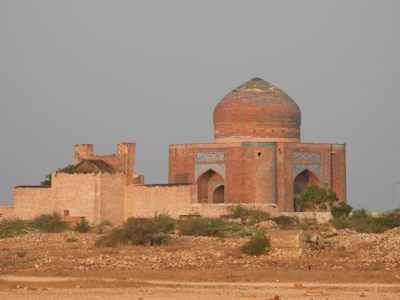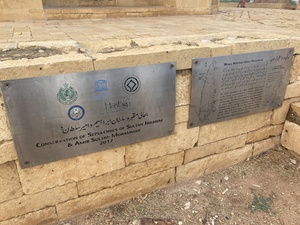Makli, Thatta

The Historical Monuments at Makli, Thatta comprise a monumental necropolis that reflects the Sindh civilization.
Thatta was the capital of the southern region of Sindh from the 14th to the 18th centuries. On its Makli Hill, one of the largest necropolises in the world with over half a million tombs and graves was built. Different architectural styles were used and some of the stone tombs are lavishly decorated with glazed tiles.
Community Perspective: another little-visited Pakistani site. Shombob described how to visit it from nearby Karachi, while Els covered what you may expect to see.
Map of Makli, Thatta
Load mapCommunity Reviews
Els Slots

There are some WHS on the List where it is hard to imagine what they are about and what they look like before you visit it. For me that always has been the case with “Makli, Thatta”. What’s Makli and what’s Thatta? Well, Makli means “little Mekkah” and is the name of the site, while Thatta is the name of the city it belongs to. The site is usually described as a necropolis, but I believe it is not really about the number of burials. It stands out for its set of monumental tombs and mausolea created in different styles by local dignitaries, who wanted to be buried near the shrine for the Sufi scholar Shaikh Jamali.
Makli was already inscribed in 1981, which seems a little early as although it is a nice site to visit it can hardly be seen as globally influential in any way; it’s more the eclectic result of a local building tradition. There is little info to go on why exactly it was made a WHS. It went through a re-focus stage post-inscription (including a name change) as described here, as the earliest incarnation seemed to suggest that other monuments in the city of Thatta were inscribed too. But only Makli is.
The entrance fee, as at all other WHS in Sindh Province, nowadays is 3,000 rupees (about 10 USD) for foreigners. It’s a vast site, impossible to cover fully on foot, with alternating areas of little interest and eye-catching monumental tombs. Our guide went on a bit about this being “the largest cemetery in the world” (not the one in Iraq, which he also was aware of), but this seems merely an example of the (often very local) chauvinism not based on facts that is common in Pakistan.
In the end, we just went to see the prettiest mausolea. To my untrained eye, they display two distinct styles of architecture. One is the local Chaukhandi style (sandstone structures with fine carvings, named after the exquisite nearby TWHS of the Chaukhandi Tombs), and the other is an adaptation of Central Asian and Persian dome-type structures with glazed tiles. A few of the latter have undergone recent renovations, mostly focusing on the exterior tilework (the Tomb of Diwan Shurfa Khan may be the best example of this). ‘The man with the keys’ is needed to open up the most precious ones, as the entrance gates to the individual mausolea are usually locked to prevent vandalism. The heavily eroded site also suffers from winds blowing in plastic trash.
After we had seen several of the tombs we asked what the green building in the distance was. It turned out to be the Sufi shrine dedicated to the Baghdadi scholar Abdullah Shah Ashabi. An electric vehicle was summoned to bring us there. The shrine is fairly small, but large crowds of pilgrims still are said to come here on Fridays. We met a few people inside. The inner courtyard holds two huge cauldrons: here food is cooked to be handed out for free to the worshippers and/or the needy.
We spent about 2 hours at Makli, which I felt was enough. It is recommended to go in the late afternoon to get the best pictures of the tombs. Upon leaving, we were invited to tea by the site manager – the first of many such ‘ceremonies’ we were to undergo in the next 2 weeks. He said he greets all foreign visitors. There is sort of a WHS plaque, which unfortunately I did not manage to locate, but they also have a pretty sign displaying the most notable tombs and the WH logo.
Read more from Els Slots here.
Shombob
I won't speak to the heritage side of this, but only the logistics. [For reference I am a white American woman who knows only like 200 Urdu words]
The sites are definitely worth going to if you are in Karachi for more than a few days and it's a shame that more people do not go. Makli is only about 1.5 hours away from the city. Not extremely well-kept which is a shame, so worth seeing now before any more damage occurs. The necropolis itself is very large, so you can hire a long golf cart for 100 rupees per person at the entrance. Foreigners must show passport and visa at several stages. Chaukundi tombs can be seen on the way there, and Shah Jehan mosque in Thatta afterwards. When I was there, we were the only ones at the Chaukundi tombs (which are an extension of the Makli necropolis) except for the guards/caretakers. One man told us a lot of history there and details of the tombs. He was very knowledgeable and friendly and we tipped him upon leaving. At Makli, inside and outside the entrance has some beggars so it is advised to move quickly once exiting your car and you can enter the golf cart. Was disappointed to see a lot of trash outside of all of the sites, due to the corrupt nature of the Pakistani government in appropriating UNESCO funds.
The road from Karachi to Thatta is safe for a day trip, and well-kept. As of May 2023 they were doing some construction on the Karachi-bound lane and forced both directions of traffic into the other lane without any safety cones, etc that you would see in developed countries. But just make sure you have a good driver and you'll be fine. For non-Pakistanis, I would recommend going in a larger van group with a driver or with privacy screens on the back windows of a car just to avoid any attention.
There are also other archaeological sites on the way and towns, including the Bhanbore site and town of Gharo (stop to eat at Cafe Imran and get the chicken karahi). I went with Humsafar Tourism who organized the trip quickly for me.
All in all, an excellent cultural site to visit in Pakistan that's very convenient to Karachi. Don't expect western-level amenities, but the food along the way will be astounding, and the sites and history unparalleled.
Michael Novins

In December 2017, I made a day trip from Karachi to Makli necropolis, about 60 miles to its east, which might be the world’s largest funerary site -- the ten square kilometer burial ground contains approximately one million tombs, mostly built between 1570 and 1640. Almost as interesting as the abundant tombs, were two elderly snake charmers who set up shop along the dirt path leading from the entrance to the tombs. The snake charmers seek visitors to fund a musical performance on the pungi, the wind instrument whose rhythmic sound and movements appear to hypnotize a de-fanged Indian cobra. Their second act is to entice visitors to purchase a serpent to battle an Indian mongoose to the death, although the mammal’s acrobatic agility, coarse coat and resistance to snake venom ensure its victory. For less than a dollar, I bought a common water snake to challenge the mongoose, but in order to maintain their inventory, my bout was interrupted by a snake wrangler who separated the two combatants. While on the way to and from Makli, I visited three locations on Pakistan's list of tentative World Heritage Sites: Chaukhandi Tombs, an early Islamic cemetery; Shah Jahan Mosque, a 17th-century mosque known for its geometric tile and brickwork; and the Port of Banbhore, an ancient city dating to the 1st century BCE. I made my arrangements with Travel & Culture Services (https://travel-culture.com).
Site Info
- Full Name
- Historical Monuments at Makli, Thatta
- Unesco ID
- 143
- Country
- Pakistan
- Inscribed
- 1981
- Type
- Cultural
- Criteria
-
3
- Categories
- Archaeological site - South (East) Asian
- Link
- By ID
Site History
2009 Name change
From "Historical Monuments of Thatta" to "Historical Monuments at Makli, Thatta"
1981 Inscribed
1980 Deferred
Site Links
Unesco Website
Official Website
In the News
Connections
The site has 19 connections
Art and Architecture
Constructions
Geography
History
Individual People
Religion and Belief
Timeline
Trivia
Visiting conditions
WHS Names
WHS on Other Lists
World Heritage Process
Visitors
41 Community Members have visited.
The Plaque
 (external source)
(external source) (photo by Els)
(photo by Els)